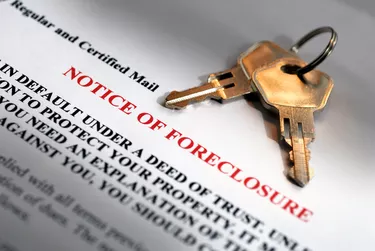
In many states, when a mortgage lender forecloses on a home or other property, the owner gets one last chance to stop the process by immediately paying the entire balance of the mortgage, plus legal and other costs associated with the foreclosure. This is called redemption, and the foreclosure will be noted on the property owner's credit report as having been redeemed.
Foreclosures and Credit Reports
Video of the Day
Because property foreclosures are a matter of public record, they appear on credit reports. A foreclosure on a credit report isn't as bad as a bankruptcy, according to Maxine Sweet of the Experian credit bureau, but it can do nearly as much damage to your ability to borrow money. Separate from the foreclosure itself, your credit report also will show the late mortgage payments that led up to the foreclosure.
Video of the Day
Seven Years on Report
Foreclosures typically remain on a credit report for seven years from the date the foreclosure action was first filed. If you redeem a foreclosure and keep the property, the entry on your credit report will be updated to reflect that fact, but the record of the foreclosure still will remain until seven years have passed from the original entry.
Removal Likely Impossible
The only time you can have a redeemed foreclosure removed from your credit report is when the entry itself is inaccurate -- that is, if the property was never actually foreclosed upon. If there was in fact a foreclosure and the entry is accurate, then you will just have to wait until seven years pass and the credit bureaus are required by law to remove it. The Federal Trade Commission warns that any "credit repair" company that promises it can "erase" accurate information from a credit report likely is a scam.